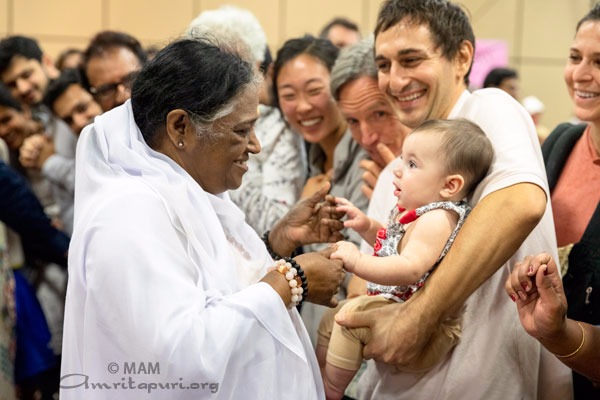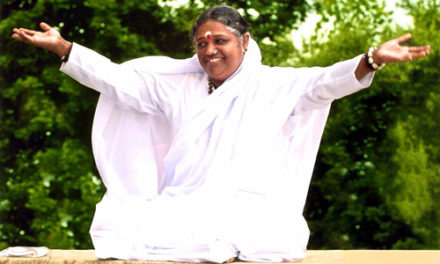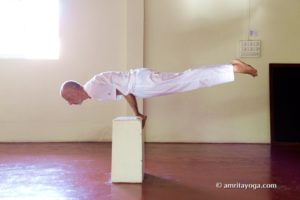 The theme of our 4-Day Intermediate to Advanced Amrita Yoga Retreat (January 27-31, 2015) was Universal Motherhood. As a man, I felt somewhat marginalized, but it took me by surprise and led me to the truth in a loving way. Coming from the strenuous background of Ashtanga Yoga, I was expecting an asana class centered on motherhood that would be too easy and gentle. Instead it was intense, fun-loving and challenging.
The theme of our 4-Day Intermediate to Advanced Amrita Yoga Retreat (January 27-31, 2015) was Universal Motherhood. As a man, I felt somewhat marginalized, but it took me by surprise and led me to the truth in a loving way. Coming from the strenuous background of Ashtanga Yoga, I was expecting an asana class centered on motherhood that would be too easy and gentle. Instead it was intense, fun-loving and challenging.
I come from a culture that views motherhood with condescension, even so-called feminists daring to treat wives and mothers with disdain. But this was different. The first-day asanas were designed to open the hips and strengthen them as if preparing to give birth. It had not previously occurred to me that it just might be about the most physically difficult act a human body can perform! So it wasn’t really about preparing my male hips for something they weren’t designed for, but about opening my male mind to some calisthenics it may not have been designed for either! I was getting a new perspective.
As we progressed from intermediate to advanced asanas such as Urdhva Dhanurasana (Wheel), Adho Mukha Vrksasana (Handstand), Bakasana (Crane), Pincha Mayurasana (Forearm Balance), Mayurasana (Peacock), and Eka Pada Galavasana (One-legged Crow), I approached them with my usual focus on alignment and strength. I was glad I could do most of the asanas, but Peacock and One-legged Crow were beyond my ability.
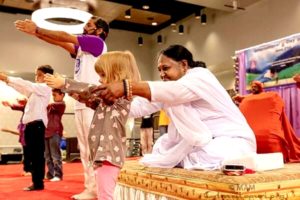 Playful Yoga
Playful Yoga
In fact, I was in a considerable state of tension even with the asanas I could do. Why was that? I wasn’t coming from the right place. Then our teacher Brahmacharini Shobha unexpectedly said, “Approach this with a playful attitude.” Suddenly the atmosphere of the class changed. Her words kept entering me more deeply and vibrating in every cell. It bypassed the mind and went very subtle. I don’t remember and cannot say how deep it went. It hit me on all levels.
One of the students, Jose Romero from Brazil, said, “It felt like playing on Mother’s lap.”
Prabha, another student, remarked, “I loved the playfulness and lightness of the classes. It was a totally holistic teaching: mantras, breath work and quotes from Amma.”
Visuddhi from Germany, Alessandra from Brazil, and Meenakshi from USA, all said the same thing. They loved how each of the intermediate and advanced postures were broken down carefully into individual parts. It was very clever.
While we were straining, trying to hold many of the poses, our instructor had us visualize Amma supporting our backs or chests. As Sunanda put it, “This helped so much to transcend the tension, by just letting go. We deepened into communion!”
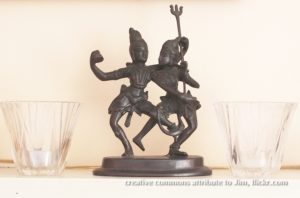 The Wisdom of the Divine Mother
The Wisdom of the Divine Mother
God as feminine has been a foreign idea for me. Certainly the fearsome Kali murti (idol) in the temple was not an image I found appealing. In Sanatana Dharma, the idea of the masculine principle as Purusha or Consciousness, and the feminine principle as Prakriti or Creation made sense. In a satsang with Brahmachari Shraddhamrita, someone asked, “Why was Maya, the creation even created?” His answer, taken from the Devi Mahatmyam scripture extolling the greatness of the Divine Mother, was interesting. Maya is just a veil of ignorance, and the journey for each soul is merely a purification process, without which we cannot discover the profound mystery of the Self.
It is out of compassion that Devi veils Herself as Her fierce brilliance would annihilate us before we were ready. So we need to prepare ourselves for this process and approach Her slowly. The milk of the lioness can only be stored in a golden vessel. This means that only the pure vessel of a pure mind can contain Devi’s powerful shakti (energy).
I was beginning to understand that yoga practices purify us so that we can receive the energy of the Goddess. Amma compares this process to alchemy. It is like turning iron into pure gold. I found an analogy in my Ashtanga practice of the strenuous effort required when my rusty joints were creaking in agony to the painful yearning of my closed heart for opening.
Universal Motherhood for All
Thanks to a quote from Amma’s speech on Universal Motherhood that Shobha gave in class, I began to see the light and understand how it related to me as a man: 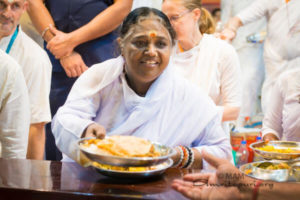 The essence of universal motherhood is not restricted to women who have given birth; it is a principle inherent in both women and men. It is an attitude of the mind. It is love – and that love is the very breath of life. No one would say, “I will breathe only when I am with my family and friends; I won’t breathe in front of my enemies.” Similarly, for those in whom motherhood has awakened, love and compassion towards everyone is as much part of their being as breathing.
The essence of universal motherhood is not restricted to women who have given birth; it is a principle inherent in both women and men. It is an attitude of the mind. It is love – and that love is the very breath of life. No one would say, “I will breathe only when I am with my family and friends; I won’t breathe in front of my enemies.” Similarly, for those in whom motherhood has awakened, love and compassion towards everyone is as much part of their being as breathing.
I have to admit I felt very far from being able to relate to that kind of compassion. But something from Amma’s energy was rubbing off on me the longer I spent in Amritapuri. I found the same people who used to irritate me during seva (selfless service) were less irritating as time went by. In the end, I even learned to appreciate them.
The Dawning of Motherly Compassion
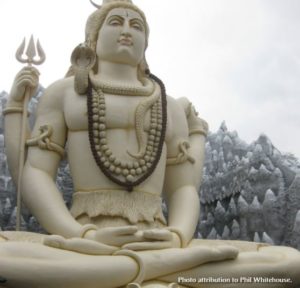 Being forced into situations with people I would never normally associate with allowed me to expand myself to include them in a feeling of warmth I normally reserved for friends. I found myself going out of my way to help people. I was happy to help others carry heavy boxes, for example – something I normally wouldn’t have thought to do for a stranger, not out of indifference but because it simply wouldn’t have occurred to me to help.
Being forced into situations with people I would never normally associate with allowed me to expand myself to include them in a feeling of warmth I normally reserved for friends. I found myself going out of my way to help people. I was happy to help others carry heavy boxes, for example – something I normally wouldn’t have thought to do for a stranger, not out of indifference but because it simply wouldn’t have occurred to me to help.
If this was the beginning of motherly compassion, it didn’t seem like a threat to my masculinity.
But I didn’t get the full feeling until the night of Shivaratri. With Amma’s presence, this austere vigil to Lord Shiva, the male principle of consciousness, was a celebration of incredible joy and love. As the crowd sang Shiva bhajans (devotional singing to Shiva) and the drumming reached a crescendo, I felt my heart open in a new way.
Amma had us visualize ourselves as radiant golden energy with sparks of golden effulgence shooting up into the universe. I felt something inexpressible and uplifting as our hearts united and we felt communion with the Divine.

